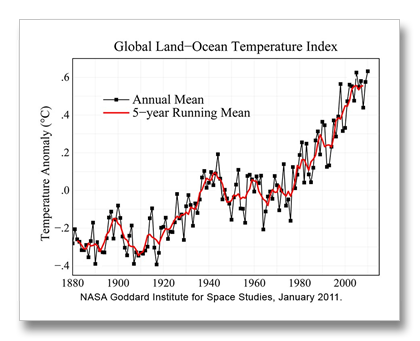The yearly average global temperature last year beat out 2005 as the warmest ever by a few hundredths of a degree. The UK Met, The United Kingdom’s national weather service, tells a little different story, but not much. They had 2011 as the second warmest ever, just behind 1998. Why the difference? The Goddard Institute for Space Studies (GISS) showed 2005 as second warmest, not 1998. What is going on is that eight of the last thirteen years are in a virtual tie for the warmest year ever. The methodologies for determining the world’s average temperature are a little different between the UK Met and GISS, so their ranking is a little different. but the fact remains that the eight warmest years ever recorded 2010, 2009, 2007, 2006, 2005, 2003, 2002 and 1998 are all within 0.05 degrees Fahrenheit of one another. All eight years are in the top 2.6 percent of the entire annual average global temperature ranking over the last 131 years.
James Hansen, Director of NASAs Goddard Institute for Space Studies, in his paper published in Reviews in Geophysics, has this to say about our future global temperature:
"One sure bet is that this decade will be the warmest in history. Yes, some scientists assert that there is decadal variability and the next decade or two could be cooler. How do we know they are wrong? Because, as we show in reference 4, the planet is now out of balance by about ¾ of a watt per square meter of Earth’s surface averaged over the solar cycle. It may not sound like much, but that is a lot of energy (in an interesting unit suggested in a colleague’s paper, Sarah Purkey and Greg Johnson?), the ¾ W/m2 corresponds, assuming a global populations of 7 billion, to every man, woman, and child on the planet running simultaneously 40 industrial strength 1400 watt hair dryers 24 hours a day 365 days a year). This energy is enough to cause the ocean to slowly warm and ice to melt all over the planet."
Hansen, J., R. Ruedy, M. Sato, K. Lo, 2010: Global surface temperature change, Rev. Geophys., 48, RG4004, 29 pp.
NASA Press Release: http://www.giss.nasa.gov/research/news/20110112/

